Sociology A1 Critical Review: Freire's Pedagogy of the Oppressed
VerifiedAdded on 2022/09/30
|6
|1402
|50
Report
AI Summary
This report provides a comprehensive analysis of Paulo Freire's 'Pedagogy of the Oppressed.' It begins by outlining the core ideas of Freire's work, including his theories on oppression, liberation, critical consciousness, and the banking model of education. The report then delves into how Freire's theories can be applied to the work of activists striving for social justice and social change. It explores the application of Freire's student-centered methodology and its implications for understanding and addressing societal inequalities. The report discusses the importance of critical awareness, challenging the status quo, and fostering an environment where students and teachers can work together. The report also examines the role of education in promoting social change and how activists can utilize Freire's principles to improve their techniques, challenge existing assumptions, and create a more just society. The report concludes by emphasizing the importance of love, motivation, and revolution to achieve meaningful and lasting change.
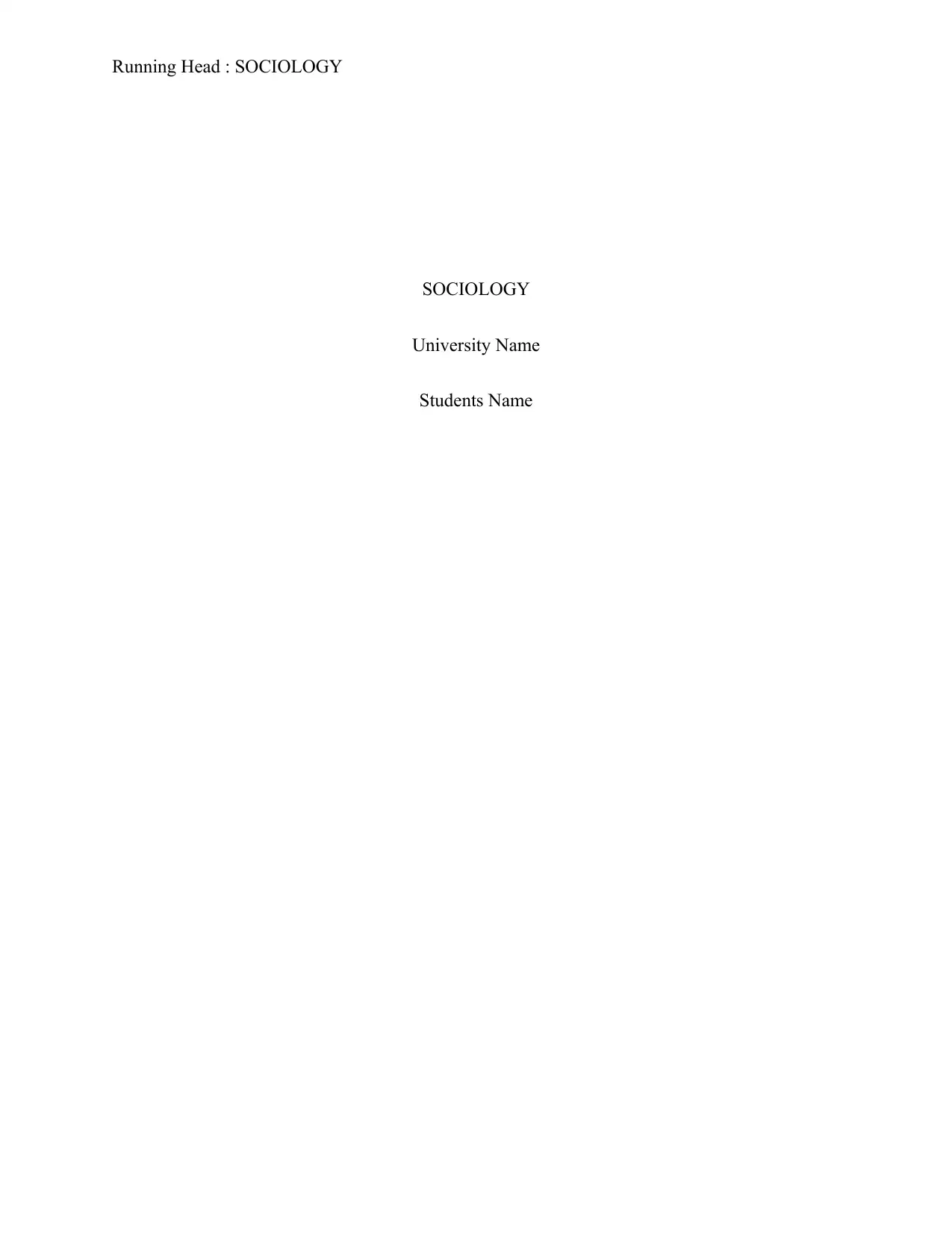
Running Head : SOCIOLOGY
SOCIOLOGY
University Name
Students Name
SOCIOLOGY
University Name
Students Name
Paraphrase This Document
Need a fresh take? Get an instant paraphrase of this document with our AI Paraphraser
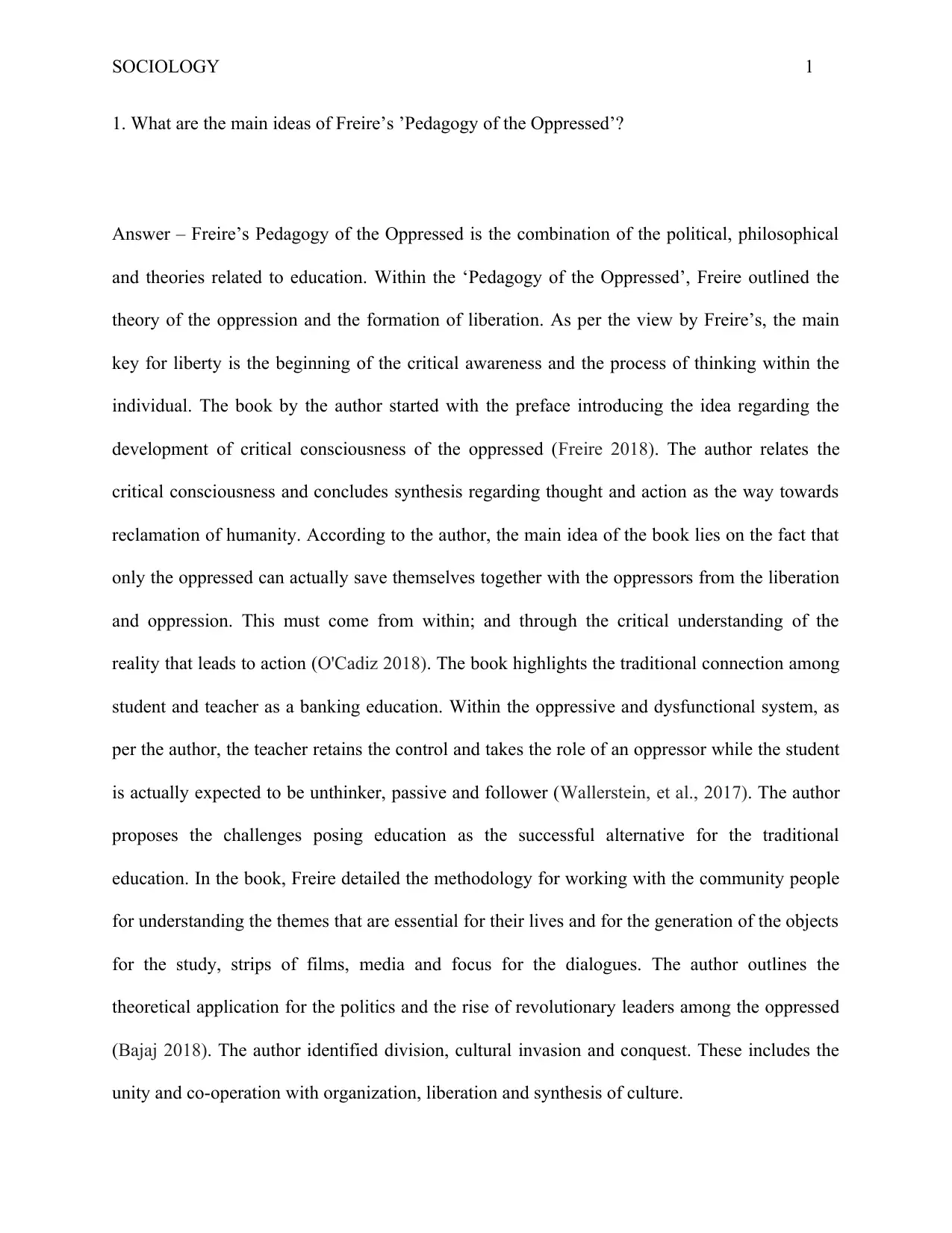
SOCIOLOGY 1
1. What are the main ideas of Freire’s ’Pedagogy of the Oppressed’?
Answer – Freire’s Pedagogy of the Oppressed is the combination of the political, philosophical
and theories related to education. Within the ‘Pedagogy of the Oppressed’, Freire outlined the
theory of the oppression and the formation of liberation. As per the view by Freire’s, the main
key for liberty is the beginning of the critical awareness and the process of thinking within the
individual. The book by the author started with the preface introducing the idea regarding the
development of critical consciousness of the oppressed (Freire 2018). The author relates the
critical consciousness and concludes synthesis regarding thought and action as the way towards
reclamation of humanity. According to the author, the main idea of the book lies on the fact that
only the oppressed can actually save themselves together with the oppressors from the liberation
and oppression. This must come from within; and through the critical understanding of the
reality that leads to action (O'Cadiz 2018). The book highlights the traditional connection among
student and teacher as a banking education. Within the oppressive and dysfunctional system, as
per the author, the teacher retains the control and takes the role of an oppressor while the student
is actually expected to be unthinker, passive and follower (Wallerstein, et al., 2017). The author
proposes the challenges posing education as the successful alternative for the traditional
education. In the book, Freire detailed the methodology for working with the community people
for understanding the themes that are essential for their lives and for the generation of the objects
for the study, strips of films, media and focus for the dialogues. The author outlines the
theoretical application for the politics and the rise of revolutionary leaders among the oppressed
(Bajaj 2018). The author identified division, cultural invasion and conquest. These includes the
unity and co-operation with organization, liberation and synthesis of culture.
1. What are the main ideas of Freire’s ’Pedagogy of the Oppressed’?
Answer – Freire’s Pedagogy of the Oppressed is the combination of the political, philosophical
and theories related to education. Within the ‘Pedagogy of the Oppressed’, Freire outlined the
theory of the oppression and the formation of liberation. As per the view by Freire’s, the main
key for liberty is the beginning of the critical awareness and the process of thinking within the
individual. The book by the author started with the preface introducing the idea regarding the
development of critical consciousness of the oppressed (Freire 2018). The author relates the
critical consciousness and concludes synthesis regarding thought and action as the way towards
reclamation of humanity. According to the author, the main idea of the book lies on the fact that
only the oppressed can actually save themselves together with the oppressors from the liberation
and oppression. This must come from within; and through the critical understanding of the
reality that leads to action (O'Cadiz 2018). The book highlights the traditional connection among
student and teacher as a banking education. Within the oppressive and dysfunctional system, as
per the author, the teacher retains the control and takes the role of an oppressor while the student
is actually expected to be unthinker, passive and follower (Wallerstein, et al., 2017). The author
proposes the challenges posing education as the successful alternative for the traditional
education. In the book, Freire detailed the methodology for working with the community people
for understanding the themes that are essential for their lives and for the generation of the objects
for the study, strips of films, media and focus for the dialogues. The author outlines the
theoretical application for the politics and the rise of revolutionary leaders among the oppressed
(Bajaj 2018). The author identified division, cultural invasion and conquest. These includes the
unity and co-operation with organization, liberation and synthesis of culture.
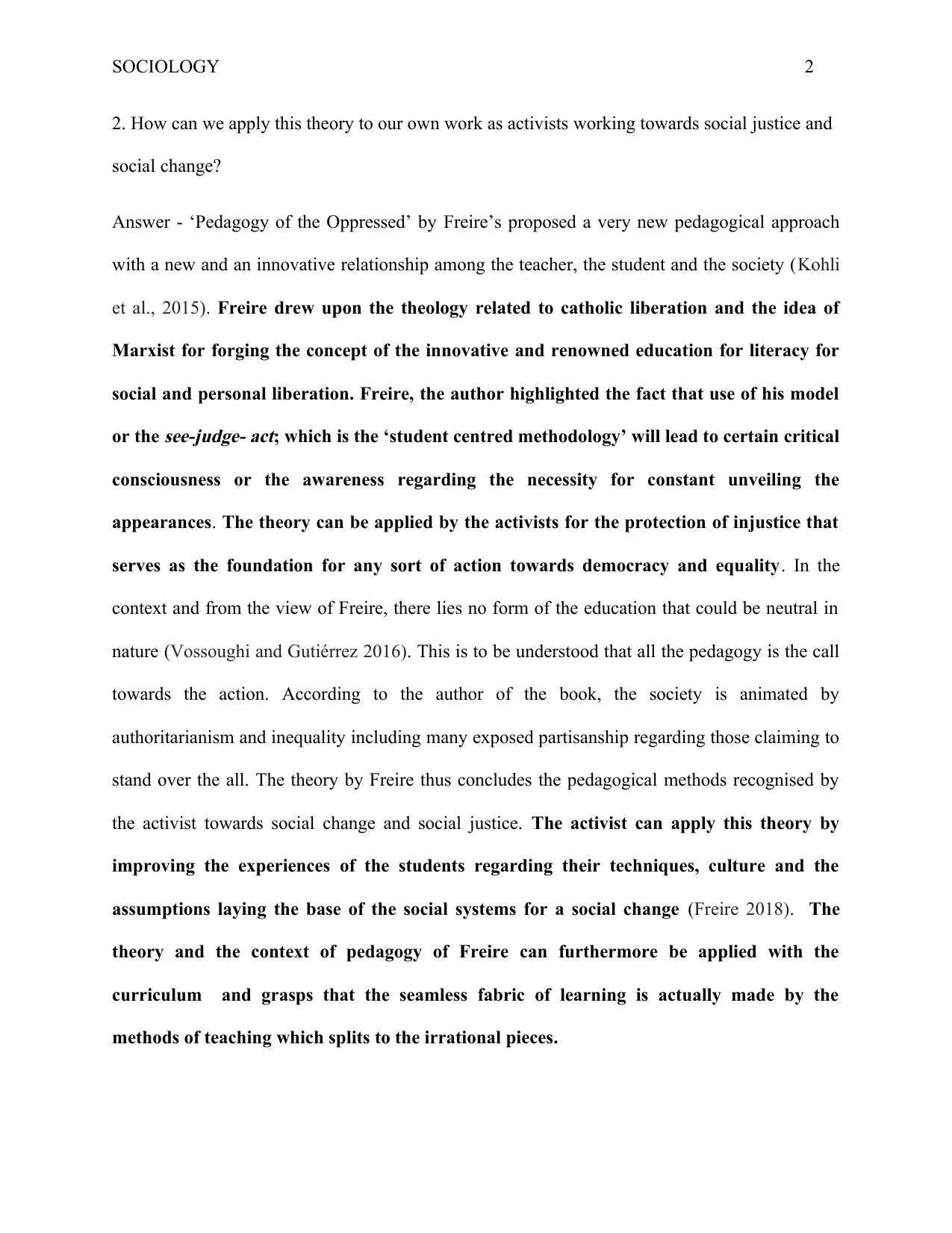
SOCIOLOGY 2
2. How can we apply this theory to our own work as activists working towards social justice and
social change?
Answer - ‘Pedagogy of the Oppressed’ by Freire’s proposed a very new pedagogical approach
with a new and an innovative relationship among the teacher, the student and the society (Kohli
et al., 2015). Freire drew upon the theology related to catholic liberation and the idea of
Marxist for forging the concept of the innovative and renowned education for literacy for
social and personal liberation. Freire, the author highlighted the fact that use of his model
or the
see-judge- act; which is the ‘student centred methodology’ will lead to certain critical
consciousness or the awareness regarding the necessity for constant unveiling the
appearances. The theory can be applied by the activists for the protection of injustice that
serves as the foundation for any sort of action towards democracy and equality. In the
context and from the view of Freire, there lies no form of the education that could be neutral in
nature (Vossoughi and Gutiérrez 2016). This is to be understood that all the pedagogy is the call
towards the action. According to the author of the book, the society is animated by
authoritarianism and inequality including many exposed partisanship regarding those claiming to
stand over the all. The theory by Freire thus concludes the pedagogical methods recognised by
the activist towards social change and social justice. The activist can apply this theory by
improving the experiences of the students regarding their techniques, culture and the
assumptions laying the base of the social systems for a social change (Freire 2018). The
theory and the context of pedagogy of Freire can furthermore be applied with the
curriculum and grasps that the seamless fabric of learning is actually made by the
methods of teaching which splits to the irrational pieces.
2. How can we apply this theory to our own work as activists working towards social justice and
social change?
Answer - ‘Pedagogy of the Oppressed’ by Freire’s proposed a very new pedagogical approach
with a new and an innovative relationship among the teacher, the student and the society (Kohli
et al., 2015). Freire drew upon the theology related to catholic liberation and the idea of
Marxist for forging the concept of the innovative and renowned education for literacy for
social and personal liberation. Freire, the author highlighted the fact that use of his model
or the
see-judge- act; which is the ‘student centred methodology’ will lead to certain critical
consciousness or the awareness regarding the necessity for constant unveiling the
appearances. The theory can be applied by the activists for the protection of injustice that
serves as the foundation for any sort of action towards democracy and equality. In the
context and from the view of Freire, there lies no form of the education that could be neutral in
nature (Vossoughi and Gutiérrez 2016). This is to be understood that all the pedagogy is the call
towards the action. According to the author of the book, the society is animated by
authoritarianism and inequality including many exposed partisanship regarding those claiming to
stand over the all. The theory by Freire thus concludes the pedagogical methods recognised by
the activist towards social change and social justice. The activist can apply this theory by
improving the experiences of the students regarding their techniques, culture and the
assumptions laying the base of the social systems for a social change (Freire 2018). The
theory and the context of pedagogy of Freire can furthermore be applied with the
curriculum and grasps that the seamless fabric of learning is actually made by the
methods of teaching which splits to the irrational pieces.
⊘ This is a preview!⊘
Do you want full access?
Subscribe today to unlock all pages.

Trusted by 1+ million students worldwide
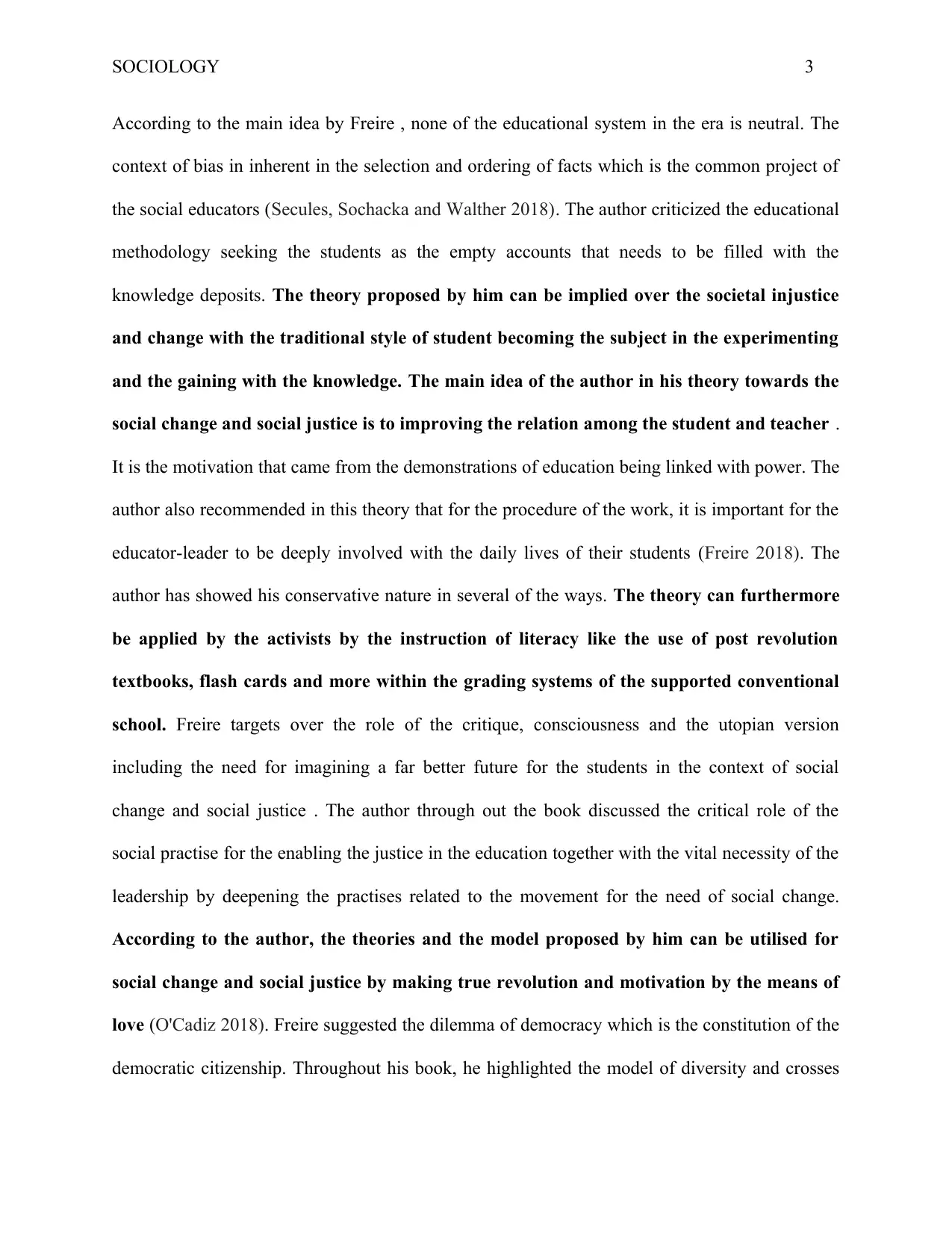
SOCIOLOGY 3
According to the main idea by Freire , none of the educational system in the era is neutral. The
context of bias in inherent in the selection and ordering of facts which is the common project of
the social educators (Secules, Sochacka and Walther 2018). The author criticized the educational
methodology seeking the students as the empty accounts that needs to be filled with the
knowledge deposits. The theory proposed by him can be implied over the societal injustice
and change with the traditional style of student becoming the subject in the experimenting
and the gaining with the knowledge. The main idea of the author in his theory towards the
social change and social justice is to improving the relation among the student and teacher .
It is the motivation that came from the demonstrations of education being linked with power. The
author also recommended in this theory that for the procedure of the work, it is important for the
educator-leader to be deeply involved with the daily lives of their students (Freire 2018). The
author has showed his conservative nature in several of the ways. The theory can furthermore
be applied by the activists by the instruction of literacy like the use of post revolution
textbooks, flash cards and more within the grading systems of the supported conventional
school. Freire targets over the role of the critique, consciousness and the utopian version
including the need for imagining a far better future for the students in the context of social
change and social justice . The author through out the book discussed the critical role of the
social practise for the enabling the justice in the education together with the vital necessity of the
leadership by deepening the practises related to the movement for the need of social change.
According to the author, the theories and the model proposed by him can be utilised for
social change and social justice by making true revolution and motivation by the means of
love (O'Cadiz 2018). Freire suggested the dilemma of democracy which is the constitution of the
democratic citizenship. Throughout his book, he highlighted the model of diversity and crosses
According to the main idea by Freire , none of the educational system in the era is neutral. The
context of bias in inherent in the selection and ordering of facts which is the common project of
the social educators (Secules, Sochacka and Walther 2018). The author criticized the educational
methodology seeking the students as the empty accounts that needs to be filled with the
knowledge deposits. The theory proposed by him can be implied over the societal injustice
and change with the traditional style of student becoming the subject in the experimenting
and the gaining with the knowledge. The main idea of the author in his theory towards the
social change and social justice is to improving the relation among the student and teacher .
It is the motivation that came from the demonstrations of education being linked with power. The
author also recommended in this theory that for the procedure of the work, it is important for the
educator-leader to be deeply involved with the daily lives of their students (Freire 2018). The
author has showed his conservative nature in several of the ways. The theory can furthermore
be applied by the activists by the instruction of literacy like the use of post revolution
textbooks, flash cards and more within the grading systems of the supported conventional
school. Freire targets over the role of the critique, consciousness and the utopian version
including the need for imagining a far better future for the students in the context of social
change and social justice . The author through out the book discussed the critical role of the
social practise for the enabling the justice in the education together with the vital necessity of the
leadership by deepening the practises related to the movement for the need of social change.
According to the author, the theories and the model proposed by him can be utilised for
social change and social justice by making true revolution and motivation by the means of
love (O'Cadiz 2018). Freire suggested the dilemma of democracy which is the constitution of the
democratic citizenship. Throughout his book, he highlighted the model of diversity and crosses
Paraphrase This Document
Need a fresh take? Get an instant paraphrase of this document with our AI Paraphraser
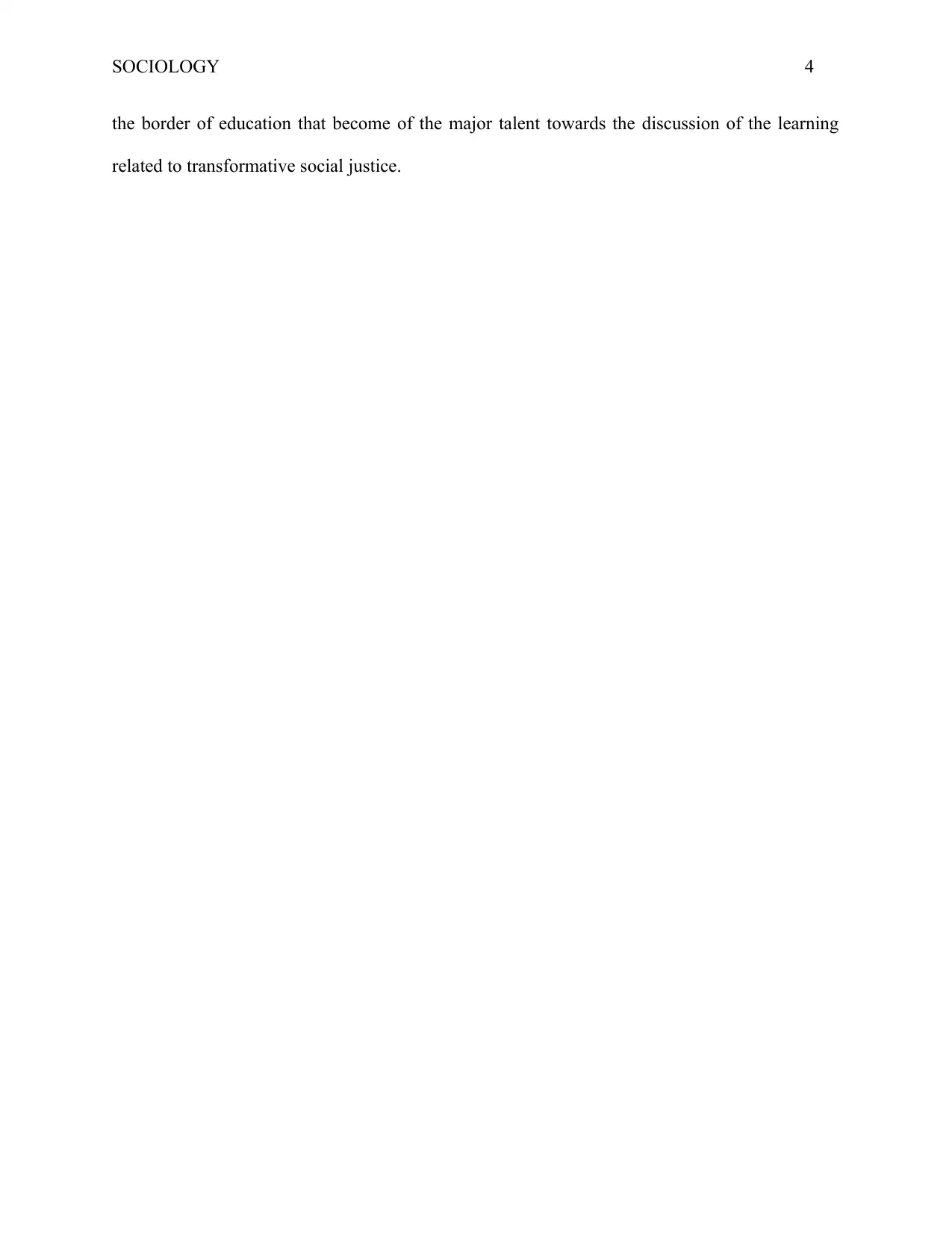
SOCIOLOGY 4
the border of education that become of the major talent towards the discussion of the learning
related to transformative social justice.
the border of education that become of the major talent towards the discussion of the learning
related to transformative social justice.
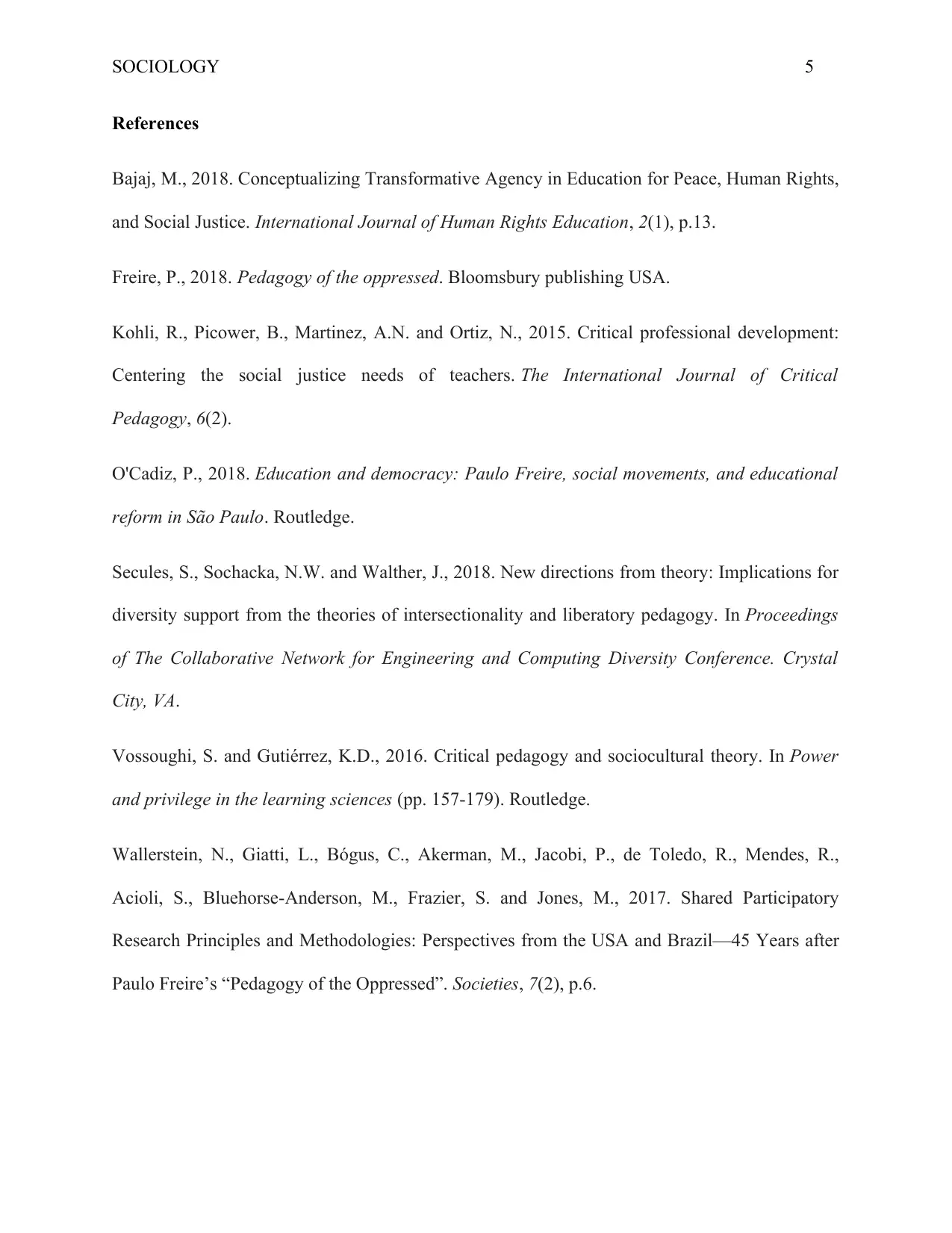
SOCIOLOGY 5
References
Bajaj, M., 2018. Conceptualizing Transformative Agency in Education for Peace, Human Rights,
and Social Justice. International Journal of Human Rights Education, 2(1), p.13.
Freire, P., 2018. Pedagogy of the oppressed. Bloomsbury publishing USA.
Kohli, R., Picower, B., Martinez, A.N. and Ortiz, N., 2015. Critical professional development:
Centering the social justice needs of teachers. The International Journal of Critical
Pedagogy, 6(2).
O'Cadiz, P., 2018. Education and democracy: Paulo Freire, social movements, and educational
reform in São Paulo. Routledge.
Secules, S., Sochacka, N.W. and Walther, J., 2018. New directions from theory: Implications for
diversity support from the theories of intersectionality and liberatory pedagogy. In Proceedings
of The Collaborative Network for Engineering and Computing Diversity Conference. Crystal
City, VA.
Vossoughi, S. and Gutiérrez, K.D., 2016. Critical pedagogy and sociocultural theory. In Power
and privilege in the learning sciences (pp. 157-179). Routledge.
Wallerstein, N., Giatti, L., Bógus, C., Akerman, M., Jacobi, P., de Toledo, R., Mendes, R.,
Acioli, S., Bluehorse-Anderson, M., Frazier, S. and Jones, M., 2017. Shared Participatory
Research Principles and Methodologies: Perspectives from the USA and Brazil—45 Years after
Paulo Freire’s “Pedagogy of the Oppressed”. Societies, 7(2), p.6.
References
Bajaj, M., 2018. Conceptualizing Transformative Agency in Education for Peace, Human Rights,
and Social Justice. International Journal of Human Rights Education, 2(1), p.13.
Freire, P., 2018. Pedagogy of the oppressed. Bloomsbury publishing USA.
Kohli, R., Picower, B., Martinez, A.N. and Ortiz, N., 2015. Critical professional development:
Centering the social justice needs of teachers. The International Journal of Critical
Pedagogy, 6(2).
O'Cadiz, P., 2018. Education and democracy: Paulo Freire, social movements, and educational
reform in São Paulo. Routledge.
Secules, S., Sochacka, N.W. and Walther, J., 2018. New directions from theory: Implications for
diversity support from the theories of intersectionality and liberatory pedagogy. In Proceedings
of The Collaborative Network for Engineering and Computing Diversity Conference. Crystal
City, VA.
Vossoughi, S. and Gutiérrez, K.D., 2016. Critical pedagogy and sociocultural theory. In Power
and privilege in the learning sciences (pp. 157-179). Routledge.
Wallerstein, N., Giatti, L., Bógus, C., Akerman, M., Jacobi, P., de Toledo, R., Mendes, R.,
Acioli, S., Bluehorse-Anderson, M., Frazier, S. and Jones, M., 2017. Shared Participatory
Research Principles and Methodologies: Perspectives from the USA and Brazil—45 Years after
Paulo Freire’s “Pedagogy of the Oppressed”. Societies, 7(2), p.6.
⊘ This is a preview!⊘
Do you want full access?
Subscribe today to unlock all pages.

Trusted by 1+ million students worldwide
1 out of 6
Related Documents
Your All-in-One AI-Powered Toolkit for Academic Success.
+13062052269
info@desklib.com
Available 24*7 on WhatsApp / Email
![[object Object]](/_next/static/media/star-bottom.7253800d.svg)
Unlock your academic potential
Copyright © 2020–2026 A2Z Services. All Rights Reserved. Developed and managed by ZUCOL.





